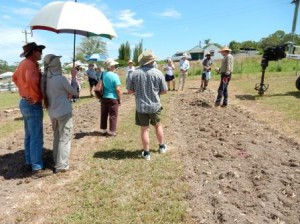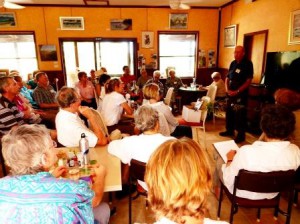Field Day November 2014
HFFN and the Hunter Local Land Services (HLLS) which provided funding had a very successful field day on tree planting led by Matt Kilby (Global Land Repair www.globallandrepair.com.au) and Noel Jupp (Riverdene Nursery www.riverdenenursery.com.au) demonstrating their proven methods. Forty five persons attended, undeterred by the heat, of which the majority were HFFN members. The field day was held at Wootton where HLLS is funding the plantation of thousands of trees with Noel providing the plants and Matt supervising the planting.
Some key points were: 6 months is required to prepare the land for planting by loosening the soil and removing weeds preferably without herbicide; the need to introduce fungi in the hole and not to fill the hole with water before planting; plants should be in a concave ditch that drains water to the root ball; a mat or compost/ wood chip is used to prevent the growth of weeds; the plants should be soaked in water for a week before planting and 20 litres poured on the plant when finished. If the weather is fine, it may not need further watering. Use a tree guard for the first 2 years.
The role of the mycorrhiza fungi and their interaction with plants can be read at http://www.cpbr.gov.au/fungi/mycorrhiza.html.
Noel said to improve soil he recommends that mulched and worm digested melaleuca styphelioides (prickly-leafed paper bark) is the very best but there is also a lack of these plants. Lantana, cabbages, ebony PR cow peas which can be planted and ploughed in in March before planting in April. Also, field lupins and he suggested planting pills which contain fertiliser and an insecticide and the use of blood and bone (the more odorous the better), to deter hares and wallabies.
An enjoyable lunch was provided by the Wootton Community Centre. Despite the high temperatures members felt a buzz of excitement learning from these 2 well known experts.
Matt with his hole digger preparing to plant Noel outlining his approach to growing seedlings

